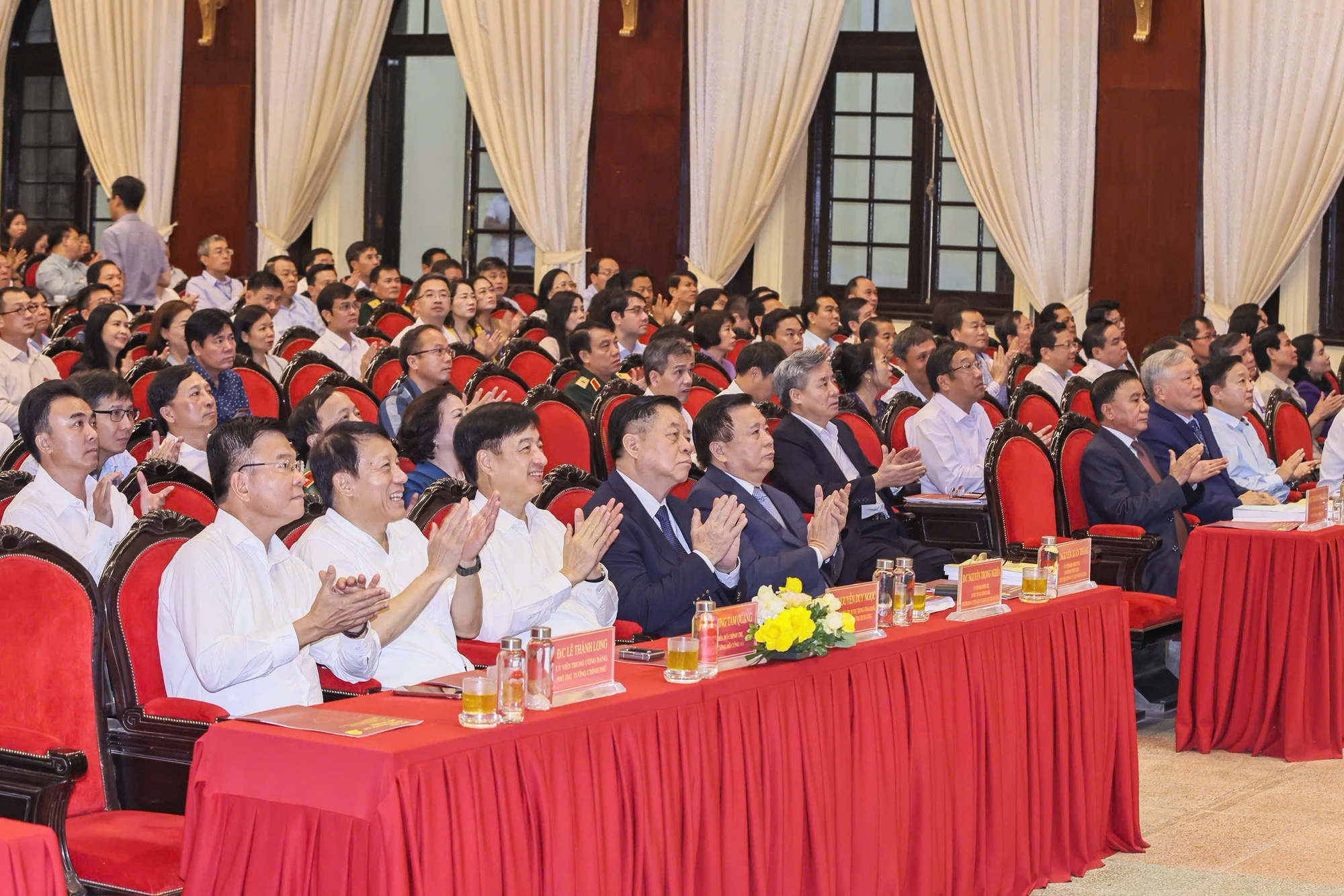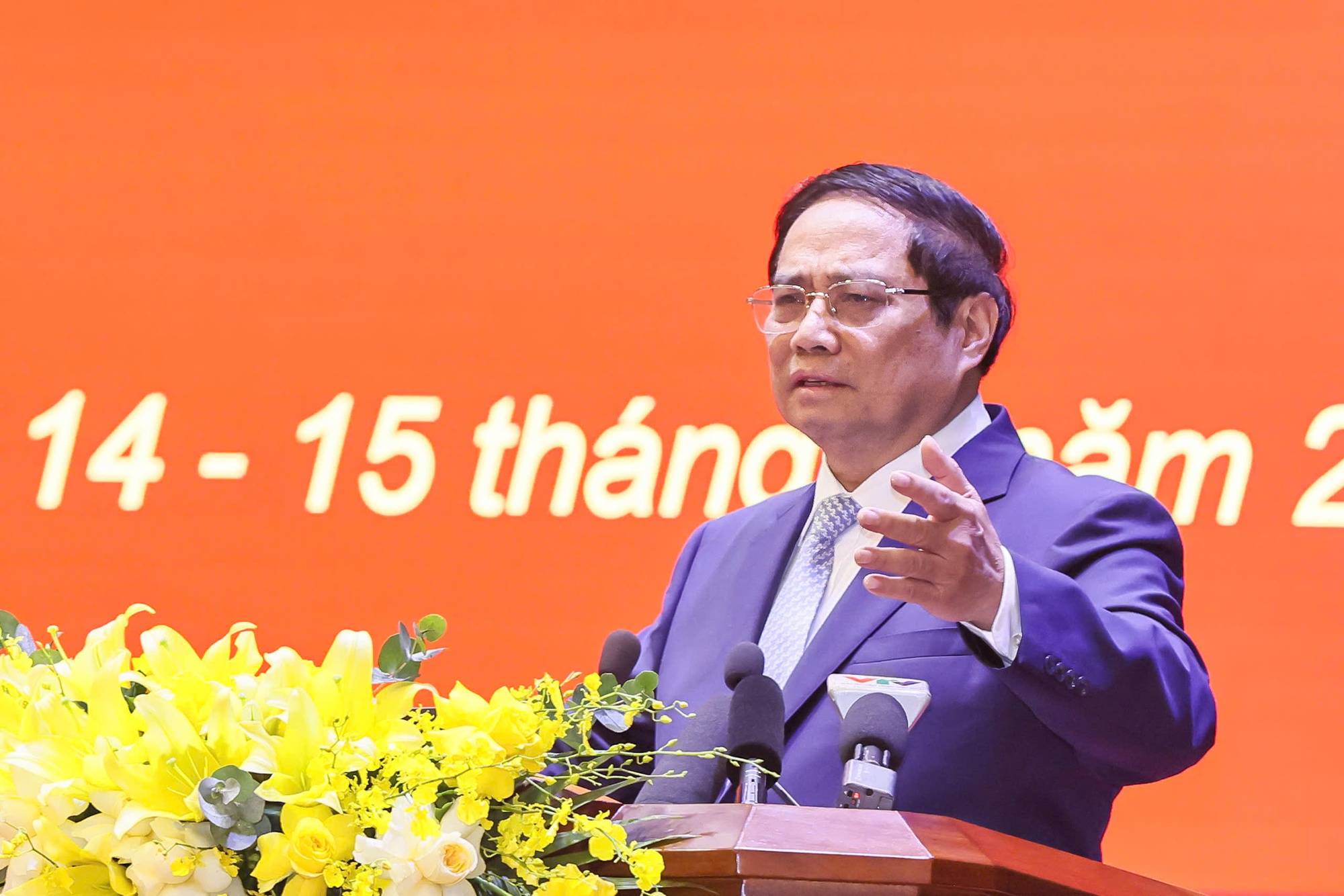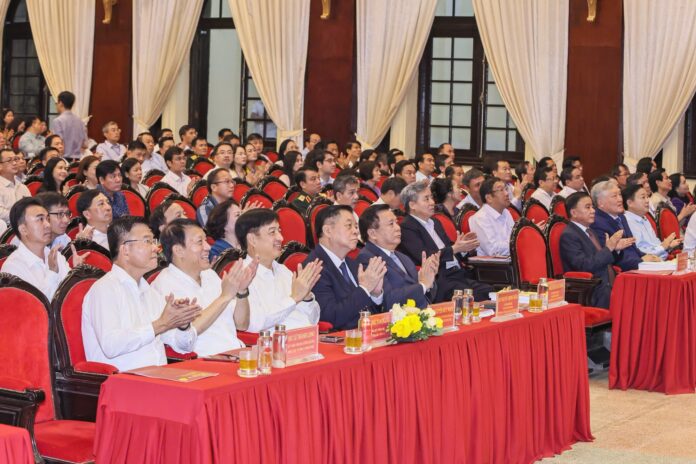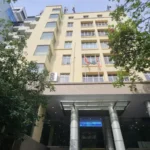On the morning of June 14, Politburo member and Prime Minister Pham Minh Chinh chaired and delivered a speech at the teleconference on professional and specialized training related to the organizational building of the Party, state administration, and the organization and operation of the Fatherland Front and political societies at the communal level (newly established).

Party and State leaders and delegates attending the conference at the central location. Photo: Nhat Bac
Also attending the conference were Politburo member and Permanent Secretary of the Party Central Committee’s Secretariat Tran Cam Tu; Politburo members, Party Central Committee secretaries, Politburo members, leaders of ministries, sectors, and central agencies and localities. The conference was connected online from the main venue at the Ho Chi Minh National Academy of Politics to 11,000 locations nationwide, with over 1.5 million delegates in attendance.
Speaking at the conference, Prime Minister Pham Minh Chinh emphasized important issues related to the revolution in the organizational apparatus of the political system, including the rearrangement of administrative boundaries and the organization of local governments at two levels.
First, we must recognize that this is a revolution in the organizational apparatus of the political system, and it must be approached with great determination, drastic measures, unity, synchrony, and simultaneity.
According to the Prime Minister, a revolution presents opportunities that must be maximized to create synergy, motivation, and inspiration. However, there will also be challenges and obstacles along the way. Transitioning from one state to another requires a lag time for adjustment and adaptation, so we must be persistent and steadfast in our efforts, learning from experience and gradually expanding our scope without being overly cautious or hasty. When opportunities arise, we must seize them with a sense of urgency and boldness, but always with a guarantee of success and without half-measures.

Prime Minister Pham Minh Chinh speaking
Secondly, the Prime Minister recalled the remarks made by General Secretary To Lam: “In this organizational revolution, we are not only creating new development space and momentum with a broader scope and greater strength, but more importantly, we are transitioning the state apparatus (including Party committees, authorities, the Fatherland Front, and socio-political organizations) from a passive role of receiving and resolving issues from the people and businesses to a proactive, service-oriented role that actively addresses the needs and issues of the people and businesses.”
“We must deeply internalize this spirit because the people eagerly await the fruits of this revolution, and our international friends are also closely watching. Of course, we must remain humble and patient as we await the tangible impacts of this revolution on our socio-economic development,” said the Prime Minister.
The Prime Minister went on to say that this revolution is also a solution, along with other solutions such as implementing the “four pillars,” to contribute to achieving an 8% growth rate this year and double-digit rates in the following years, realizing the two centenary goals that have been set. These solutions are additional measures to those outlined in the Resolution of the 13th Party Congress.
The Prime Minister expressed his expectation that the two-level local government would undergo a true transformation, and that the central government would also need to transform. The ministries, sectors, and central agencies would play a creative role, refraining from specific tasks and focusing on groups of state management tasks instead.
Thirdly, the Prime Minister emphasized the need to promote decentralization and delegation of power to local governments, coupled with resource allocation, enhanced implementation capacity, and strengthened monitoring and inspection. He stressed the importance of “knowing before managing, not managing what you don’t know,” and eliminating the “permission” culture.
The Prime Minister noted that a review of 5,076 legal documents revealed that the Government and the Prime Minister had delegated 152 tasks to local governments, ministers had delegated 913 tasks, and 1,248 tasks and competencies had been identified for delineation of authority.
Based on this review, ministries and ministerial-level agencies have submitted to the Government 28 decrees on decentralization, delegation, and delineation of authority by sector and field. Moving forward, further reviews will be conducted to continue delegating and decentralizing, strengthening post-inspection, reducing pre-inspection, and reducing red tape, harassment, and “permission” culture.
The Two-Tier Local Government Will Bring Benefits to the People
The Prime Minister pointed out that with the reduction from 63 to 34 provinces and cities, each locality would have a population of over 2 million, and the implementation of a two-tier government would result in more work, a wider scope of management, and more complex tasks. Therefore, Party committees, authorities, and the Fatherland Front and political-social organizations at all levels, especially at the grassroots level, must be proactive, creative, flexible, and highly responsible, maintaining close connections with the people and actively creating favorable conditions and providing services to the people.
The Prime Minister requested that Party committees, authorities, and the Fatherland Front and political-social organizations at all levels, especially the leaders, pay close attention to the voices of the people and businesses, stay close to reality, and actively engage with the grassroots to address practical issues. He also emphasized the importance of information and propaganda, with the press and media playing an important role in this regard through relevant topics and columns.
Highlighting that the sole objective of the Party is to secure independence, freedom, and happiness for the people and protect the sovereignty, territorial integrity, and interests of the nation, the Prime Minister expressed his belief that with the current strong momentum and resources, the two-tier government would function smoothly and bring benefits to the people.
The Prime Minister directed the Party committees, authorities, and agencies to focus on strictly, synchronously, and drastically implementing the conclusions of the Politburo and the Secretariat, especially Conclusion No. 167-KL/TW, on the policy of organizing the apparatus and administrative units and putting into operation the two levels of province and commune from July 1, 2025.
Where Starbucks Meets Iced Tea and Skewers, and Banh Mi Takes on McDonald’s and Lotteria
Hoan Lake is the golden spot for luxury brands, but it also harbors a stronghold of affordable eateries. This unique coexistence paints a fascinating picture of the heart of the capital, where the finest and the humble thrive side by side.
Unlocking Vietnam’s Railway Renaissance: A Visionary Proposal from the Prime Minister to Transform the Industry with a $24.5 Billion Revenue Giant.
The company’s forte lies in transportation and logistics. With a fleet of cutting-edge vehicles and a team of industry veterans, they navigate the complexities of modern transportation with ease. Their expertise spans across land, sea, and air, ensuring seamless delivery every time. This group is the linchpin that keeps the world’s supply chains turning.
What Stocks Surge Amid the Israel–Iran Armed Conflict?
The Israeli preemptive strike in the early hours of June 13 and Iran’s retaliation risk escalating tensions between the two Middle Eastern nations, potentially leading to a direct conflict with devastating humanitarian and economic consequences. Financial markets have already reacted, reflecting expectations and predictions about the war’s impact.













































